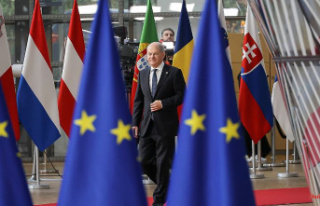Today the Bundestag decides on the financing of Olfas Scholz' "Doppel-Wumms", the federal government's aid package. Among other things, this is intended to pay for the gas price brake. Economic politician Jens Spahn explains why the Union is not in favor of Maybrit Illner on ZDF.
200 billion euros in new debt. The Bundestag is to decide on this on Friday. They are in a so-called special fund, from which, among other things, the gas and electricity price brakes are to be paid for. With the votes of the traffic light coalition, the financing will also be guaranteed in the end. But the debate will be met with fierce resistance from the opposition, and the Union will not agree to the funding. The deputy Union faction leader Jens Spahn made that clear on Maybrit Illner on ZDF.
The Union wants to support people with low incomes. But when the Bundestag votes on the financing, nobody knows what the federal government's proposal will actually be. "There is a proposal from the gas commission that is now a week and a half old. But we don't know what the federal government will implement," said Spahn. Citizens and industry should finally know what to expect this winter. So far, it has only been announced that the basic gas requirements will probably be financed in March. That's complex, Spahn admits. "But if we had done that four months ago, he would be here now." In fact, months ago, the Union had discussed a gas price brake as a replacement for the gas surcharge.
SPD General Secretary Kevin Kühnert explains in the same program that it is not known whether the full amount of 200 billion euros will be needed at all. But maybe it won't be enough. The federal spokeswoman for the Green Youth, Sarah Lee Heinrich, also assumes that another aid package will have to be decided next year - that would be number four. She believes postponing the debt brake would be a more honest policy.
Spahn sees another problem: At the moment, no medium-sized company is investing. This is also confirmed by BDI President Siegfried Russwurm at Illner: According to a survey, the majority of medium-sized commercial companies cannot afford any investments due to the high inflation in Germany, and even new developments that are already planned have to be postponed.
"We need planning security so that investments can take place," says Spahn. Here, too, the draft law of the traffic light coalition says nothing. It is not known what the 200 billion should be spent on specifically. "It's like having to pay for your cover in a pub before you even know how much you've drunk," said Spahn. The Union is not ready to sign a blank check. "We think the instrument itself is possible, it can be done," Spahn continued. But you have to follow the right order.
SPD General Secretary Kühnert tries to defend the government. He wants to know how Spahn imagines that. Whether the government of the Union should calculate every cent. That's not the point, replies Spahn. Rather, it is about the many people who now have to calculate how they are going to get through the winter, but do not know whether the federal government is planning 40, 80 or even 100 billion euros for the gas price brake. It is also unclear where the money will come from. Saving options have not yet been discussed, for example with citizen income.
Sarah Lee Heinrich from the Green Youth is a little happy: After 16 years of a grand coalition, the Union is discovering its social conscience. However, she criticizes Spahn's savings proposals. She accuses him of playing poor people off against even poorer people. "The savings potential for a lot of people is just gone," she says. "I think it's strange that you're getting the big social club out now," she tackles Spahn directly.
But Heinrich also criticized the federal government. The gas price brake, which is not supposed to take effect until March, comes much too late, she criticizes. "We are demanding that in March there must be a retrospective payment for January and February."
Kühnert then gives in a bit. Planning could actually have started earlier, he admits that the gas price brake was not an Oscar-worthy achievement. But then he accuses Jens Spahn: "On the one hand, you say it's all too late for you, on the other hand, you now want us to calculate very precisely what it all costs."
Finally, Spahn makes a promise: Now it's about the special fund itself. If there is a vote on gas and electricity price brakes and the federal government then presents a financing concept, "then things will look very different."












